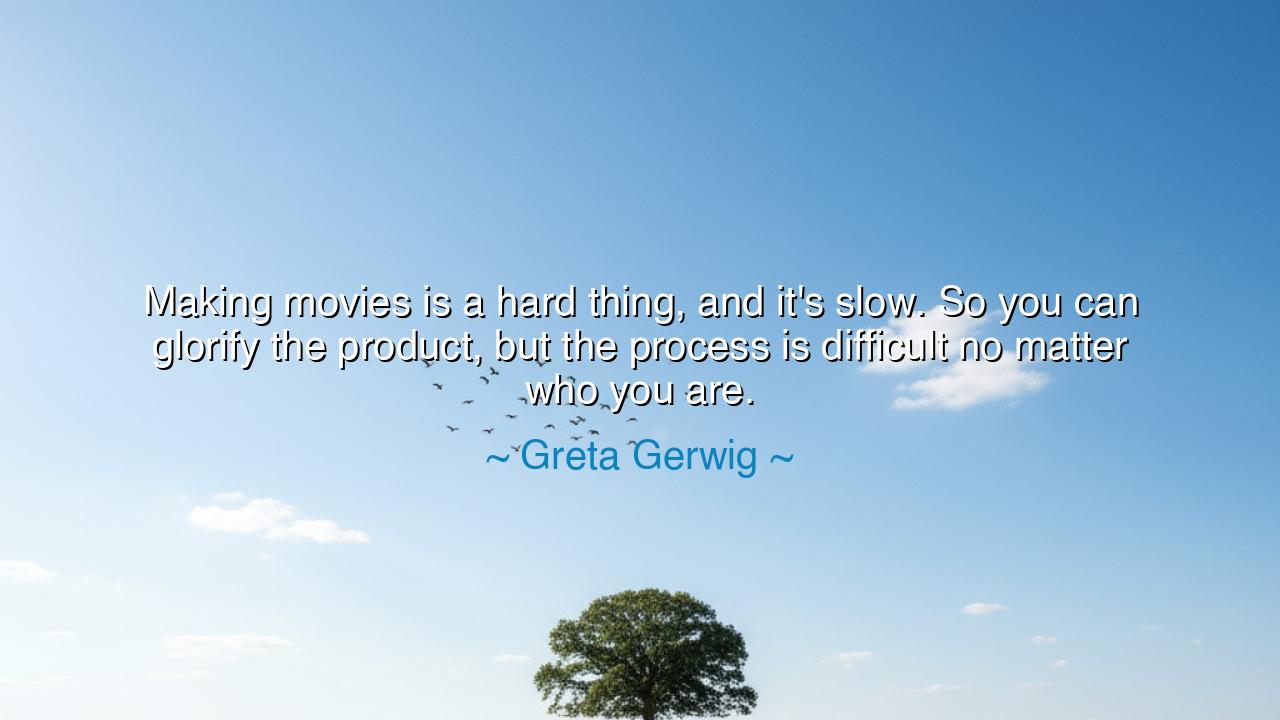
Making movies is a hard thing, and it's slow. So you can glorify
Making movies is a hard thing, and it's slow. So you can glorify the product, but the process is difficult no matter who you are.






Listen, O seekers of wisdom, for I bring forth a truth that has been whispered through the corridors of time, a truth that every great creator knows in the marrow of their bones. In the pursuit of art, in the creation of something that will endure, there is struggle and sacrifice, a path fraught with difficulty and challenge. Greta Gerwig, a master of the cinematic craft, once shared this profound insight: "Making movies is a hard thing, and it's slow. So you can glorify the product, but the process is difficult no matter who you are." In these words, she reveals the hidden truth of creation, a truth that is often concealed behind the glowing allure of finished works.
To make a movie, as Gerwig so rightly points out, is not to create in an instant. It is a journey—a long, slow, arduous process where every step is taken with patience, every detail crafted with painstaking care. The world often looks upon the finished product—the glowing accolades, the shimmering success—and sees only the beauty, the end result, the fruits of labor. But the reality of creation is far more humble, far more challenging. The product may shine, but the process is often steeped in difficulty. The artist, whether they work in cinema or any other field, must first traverse the mountains of doubt, the valleys of frustration, and the rivers of uncertainty before they can reach the summit of their vision.
Consider the story of Michelangelo, whose masterpiece, the David, is one of the most celebrated sculptures in history. Yet, when asked how he created such beauty, he famously said, "I saw the angel in the marble and carved until I set him free." The path to such greatness was not an easy one. The stone that Michelangelo chiseled was heavy, unyielding, and cold. His hands bled, his patience wore thin, and the work seemed endless. But through slow perseverance and an unwavering commitment to his craft, he brought forth a work that would define the very essence of human beauty and form. Like Gerwig, Michelangelo knew that the product, the masterpiece, was worth every drop of sweat and every moment of struggle. It is through the difficulty of the process that true artistry emerges.
And so, too, in the world of cinema, the path is one of slow struggle. Gerwig’s words remind us that to create something that will endure—whether it is a film, a book, or a song—requires not just passion, but the discipline to persist through the hardships. There are moments of doubt, moments when the vision seems too distant, too difficult to reach. Yet, it is in these very moments, in the midst of difficulty, that the true strength of the artist is revealed. The artist who can continue, despite the slow pace and the laborious work, is the one who will see their creation come to life, radiant and powerful.
Reflect upon the story of J.K. Rowling, the creator of the beloved Harry Potter series. Her journey was not an easy one. Before the world knew of Harry’s adventures, Rowling faced rejection after rejection. She was poor, struggling, and alone. The process of writing was slow, and the world around her seemed to question her vision. Yet she did not give up. Rowling’s process, fraught with difficulty and frustration, became the foundation for one of the most successful literary franchises in history. Her perseverance, despite the challenges, brought forth a product that continues to inspire millions around the world. This is the nature of creation: it is a journey through hardship, and only those who are willing to endure the slow pace will see their vision realized.
So, what lesson can we take from Gerwig’s wisdom? It is simple, yet powerful: the journey of creation is as valuable as the creation itself. In this world, we often glorify the end result—the shining product, the finished work—but we must not forget the process. The process, though slow and difficult, is where the true growth occurs. It is in the struggle, in the setbacks and the challenges, that we develop the skills, the resilience, and the character to bring forth something of true value. The product may be admired, but it is the journey that shapes us, refines us, and gives us the strength to create something that will endure.
In your own lives, remember this: when faced with the difficulties of creation—whether in art, work, or any other pursuit—do not be discouraged by the slow pace of progress. Know that the hardships you face are not obstacles, but steps along the path of growth. Embrace the difficult process, for it is through perseverance that you will achieve your highest potential. And when the product is finally realized, you will understand that it was not the finished piece that made you great, but the journey you took to create it. True greatness is not in the final destination, but in the strength and resilience developed along the way.
So go forth, O seekers, and in your creative endeavors, remember this: the process is the heart of creation. Through the slow, difficult work, you will find your true power. Glorify the journey, for it is through that journey that you will come to understand the deepest truths of your craft, and the world will one day see the brilliance that emerged from your dedication and effort.






AAdministratorAdministrator
Welcome, honored guests. Please leave a comment, we will respond soon